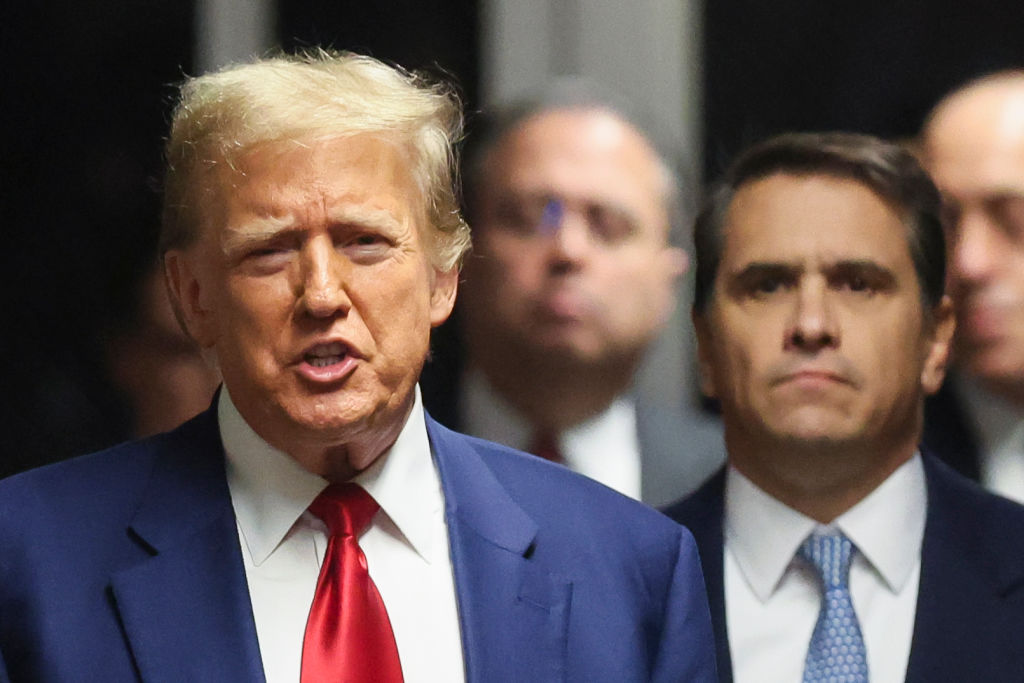
This article is part of The D.C. Brief, TIME’s politics newsletter. Sign up here to get stories like this sent to your inbox.
There are, at the moment, two likely outcomes of this billion-dollar campaign season. Each is as predictable as a roll of the dice in Las Vegas.
In one very possible scenario, Donald Trump takes the oath of office at noon on Jan. 20 of next year, with his predecessors watching from the West Front of the Capitol. They will don their polite poker faces as Trump makes history—not just as the first President since Grover Cleveland to move back into the White House after four years of political exile, but also as the first ever to have a company so linked to him that it trades on the Nasdaq under his monogram, DJT.
In an equally probable scenario, that same company is as much of a historical footnote as the ex-President’s comeback attempt. At the moment, it’s entirely possible that the multi-billion dollar valuation of Trump Media & Technology Group will have cratered by the time Inauguration Day arrives. That’s because for Trump Media’s stock to stay steady or grow, his political one has to soar.
His Truth Social platform last year brought in just a little north of $4 million—equivalent to what a single Shake Shack location takes in annually—and still lost $58 million, according to regulatory filings.
Yet somehow, the shell company set up to convey his hackneyed rants reached a $9 billion valuation, putting it up there with Etsy. It’s no longer that high but still remains wildly overvalued, unless perhaps you are convinced Truth Social’s most well-known user is about to again become the leader of the free world.
If you thought the conflicts of interest in Trump’s first term were problematic, consider the prospects of a President appearing to leverage others or allowing himself to be leveraged through a publicly traded company. Imagine the whole world spending four years tracking the ups and downs of Trump Media’s stock in real time as they speculate on how any movement connects to the Trump administration’s policy decisions. The nuclear codes and presidential immunity are nothing to sneeze at. But Trump’s return to the presidency carries a prospect that his even hinting that his position on a given issue was fungible could function as a flashing “Buy DJT Now” sign.
Concerns that Trump’s political positions being for sale are not exactly new. Most recently, the former President reversed his position on a ban on TikTok after a meeting with megadonor Jeffrey Yass, whose Susquehanna International Group holds a 15% stake in TikTok’s China-based owner umbrella company and a 2% foothold in DJT’s shell vehicle. Trump insists his flip-flop is out of concern that a ban would only make companies like Meta more powerful.
Trump’s campaign finances are a mess. For the first time in ages, Democrats are dominating the big-dollar game. Republicans are scrambling for cash after spending $100 million—or $90,000 a day—on Trump’s legal bills in four separate criminal prosecutions, not to mention his civil penalties in New York that forced Trump’s legal team to plead to an appeals court that he was too cash-poor to meet a deadline while they appealed the $464 million finding against him.
Trump, who has never denied getting rich or seeming generous by spending other people’s money, is running his brand on borrowed time.
That’s why the Trump-controlled Trump Media & Technology Group, which runs the sparsely populated Truth Social, needs to make sure its Nasdaq debut works. He is also seeking to purge any perceived dead weight. On March 24, Trump filed legal action against two former Apprentice contestants who have a stake in the social media venture. The goal? Zeroing out their ownership foothold.
“Without President Trump, Truth Social would have been impossible,” according to the lawsuit. And, in this, Trump’s lawsuit confessed the truth: this scheme only works if Trump re-summits the peak of American politics. If he fails in politics and then in business, the whole sloppy attempt to capitalize on Trump’s talents as a modern P.T. Barnum falls apart. And in a spectacular way that costs him not just the White House but billions in personal wealth—cash he may need as he submits pauper-status filings to judges to dodge his comeuppance.
If all of this seems like a messy detour from most presidential campaigns, it is. Typically, at this point, candidates are wooing mega-donors to open their wallets, super PACs—with proper distance, of course—to unleash unlimited cash, and grassroots activists to work for free knocking on doors and making calls. Trump, meanwhile, is busy fighting a legal hell, bleeding his friends dry to have his back on personal matters, and scamming his loyalists on stock prices that hinge on him simultaneously winning the White House and not cashing out as soon as his six-month golden handcuffs expire. Very few investment professionals would recommend this as a retirement kitty, but stock prices on Wednesday parked the ticker north of $6 billion. So, at least for the moment, DJT—Nasdaq’s Version—remains lucrative, even if its candidate counterpart remains just as much of a gamble.
Make sense of what matters in Washington. Sign up for the D.C. Brief newsletter.
More Must-Reads from TIME
- Donald Trump Is TIME's 2024 Person of the Year
- Why We Chose Trump as Person of the Year
- Is Intermittent Fasting Good or Bad for You?
- The 100 Must-Read Books of 2024
- The 20 Best Christmas TV Episodes
- Column: If Optimism Feels Ridiculous Now, Try Hope
- The Future of Climate Action Is Trade Policy
- Merle Bombardieri Is Helping People Make the Baby Decision
Write to Philip Elliott at philip.elliott@time.com